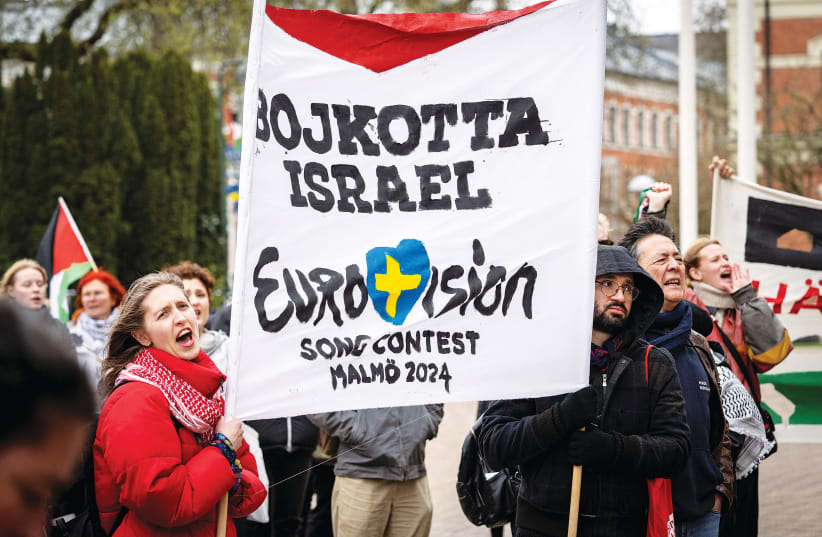There’s probably nothing more frivolous and carefree than the Eurovision Song Contest. Glitzy, low brow, and inconsequential, it’s the ultimate pop culture escape in which countries come together under the unified banner of unfettered camp and flamboyance.
However, this year’s competition in Malmo, Sweden, has taken on a deadly serious overtone due to the fierce opposition to Israel’s participation amid the Gaza war.
Eden Golan, Israel’s representative this year with the song “Hurricane,” – which hints at the October 7 massacre by Hamas without mentioning it by name – left for Malmo on Tuesday fully aware of the gravity of the situation and the likelihood of protests greeting her. “I’m on my way to represent my country on the biggest music stage in the world,” Golan said before departure in a statement from KAN, which organizes Israel’s participation.
“This year – more than ever – we have an important job to show the world that Israel is here and we’re not going anywhere. I feel pride and a sense of responsibility and I thank everyone for the months of love, backing, and support that remind me every day who I am representing.”
Anti-Israel activists have been calling for months to bar Israel from the contest and have unsuccessfully lobbied other countries’ participants to boycott the competition. Large demonstrations against Israel are planned in Malmo throughout rehearsals and semifinals that culminate in the final event on May 11.
The Israeli delegation is having round-the-clock security, and reportedly, Golan and her entourage have been told to stay in their hotel when not rehearsing for the contest, whose finals are taking place on May 11. In addition, Swedish police announced that they will use drone-mounted cameras to monitor the Malmo region and the area around Malmo Arena.
As sad and alarming as the news is that Israeli entertainers can’t go to a major European city without security usually given to heads of state, they’re not the only ones in danger in Malmo.
The Israel haters are also antisemitic, and Malmo is considered one of the world’s most antisemitic cities. Not only are residents siding with the genocidal aims of Hamas against Israel, they are blaming Jews as well.
“The antisemitic messages are everywhere now in Malmo, whether on posters or in the press,” Yair Elsner, a resident of the city, told Reuters this week. “The anti-Israel propaganda is highly visible on the streets; anti-Israeli stickers and decals are everywhere,” he said.
Aharon, another Jewish Malmo resident, said that the atmosphere in Malmo even before October 7 was anti-Israel due to its large Muslim Arab population.
“But after October 7, it only increased, and now there are protests and demonstrations everywhere, including demonstrations around places that sell Israeli products or are connected to Israelis,” he said.
What takes place in Malmo over the next few days will be a litmus test for the rest of Europe. If Israelis, and Jews, cannot walk safely down the streets of European cities, then what does the future hold?
“I want to make it clear that we are proud to be Jews in Malmo,” Jewish resident Yael Segas Wallstrom told Reuters.
“We will never hide who we are, and we will not be ashamed of our Judaism, even during challenging times like this. Of course, sometimes we think about leaving and making aliyah to Israel, but I think all Jews think about this. I was born here and have lived here for as long as I can remember. Right now, I don’t feel like there’s a threat to my life – or at least that’s what I want to believe.”
What's at stake
A lot is at stake in Malmo next week and more is riding than getting the high-score of douze points (12 points) from fans, or where the countries are ranked in the tally.
In a message on her Instagram account, Eden Golan wrote what most Israelis will be thinking of when they tune in to her performance: “This song represents us, all of us, including those who are home and aren’t – we are waiting for you.”
But in addition to representing Israel – and the hostages – Eden will be singing for all Jews who are bearing the brunt of the aggressive onslaught of fury directed at them by Hamas sympathizers around Europe, at Columbia University, and anywhere in the world where Jews are experiencing antisemitism.
This is no ordinary Eurovision contest. Lives are at stake.

